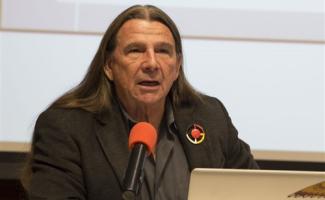Professor Morris' areas of expertise are indigenous peoples in the international legal and political arena, public law, civil liberties, and race/gender and the law. He has been active in the development of international legal standards for the defense of the rights of indigenous peoples for over thirty years. In the area of indigenous peoples' rights, he teaches "Indigenous Peoples' Politics," "Indigenous Political Systems," "Indigenous Peoples in International Law," and "Advanced Indigenous Politics." As a graduate of Harvard Law School, he also teaches a variety of law-related courses for the department, including "Race, Gender, Law and Public Policy," "Contemporary Issues in Civil Liberties," "Judicial Politics," and a freshmen seminar, "Law 101." Morris serves as the pre-law advisor for the department, and is one of two pre-law advisors for the College of Liberal Arts and Sciences.
Professor Morris directs the Fourth World Center (FWC), for the Study of Indigenous Law and Politics at CU-Denver. The FWC provides resources, research and other opportunities for the examination of the condition of indigenous peoples in a global context. For the past five consecutive years, Morris, through the FWC, has trained, sponsored and supervised the participation of dozens of indigenous students with the United Nations Permanent Forum on Indigenous Issues in New York. An example of this work was featured in Indian Country today, the largest American Indian newspaper in the United States.
Professor Morris has been awarded the permanent designation of President's Teaching Scholar (the highest peer-nominated teaching/scholarly award bestowed by the University of Colorado). He has also been the recipient of the Rosa Parks Civil Rights Award, the Cesar Chavez/Cinco de Mayo Human Rights Award, Native American Educator of the Year Award, and the Martin Luther King Peace Award. He serves as a board member, advisor and/or consultant to several boards, commissions and councils at the local, state and national level, in both the Native and non-Native communities.

